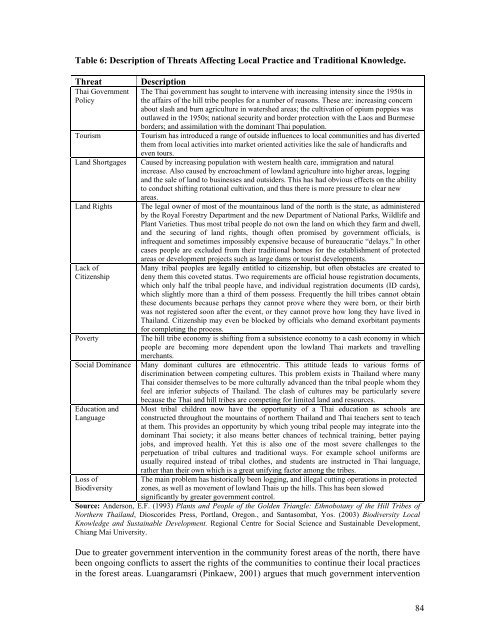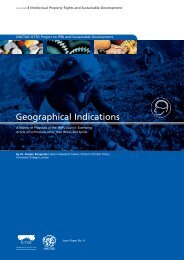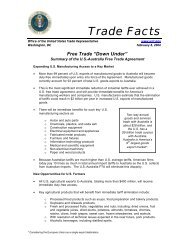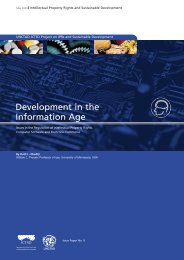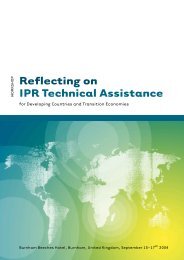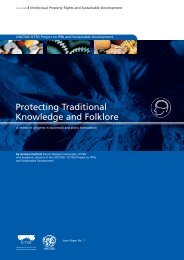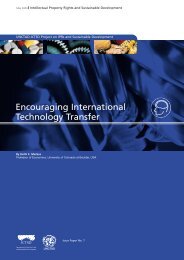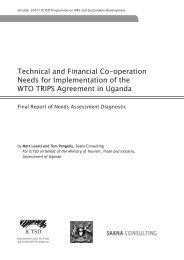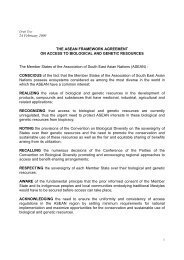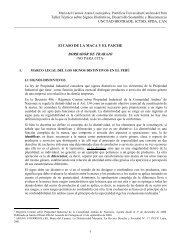Governance and Micropolitics of Traditional ... - IPRsonline.org
Governance and Micropolitics of Traditional ... - IPRsonline.org
Governance and Micropolitics of Traditional ... - IPRsonline.org
Create successful ePaper yourself
Turn your PDF publications into a flip-book with our unique Google optimized e-Paper software.
Table 6: Description <strong>of</strong> Threats Affecting Local Practice <strong>and</strong> <strong>Traditional</strong> Knowledge.<br />
Threat<br />
Thai Government<br />
Policy<br />
Tourism<br />
L<strong>and</strong> Shortgages<br />
L<strong>and</strong> Rights<br />
Lack <strong>of</strong><br />
Citizenship<br />
Poverty<br />
Description<br />
The Thai government has sought to intervene with increasing intensity since the 1950s in<br />
the affairs <strong>of</strong> the hill tribe peoples for a number <strong>of</strong> reasons. These are: increasing concern<br />
about slash <strong>and</strong> burn agriculture in watershed areas; the cultivation <strong>of</strong> opium poppies was<br />
outlawed in the 1950s; national security <strong>and</strong> border protection with the Laos <strong>and</strong> Burmese<br />
borders; <strong>and</strong> assimilation with the dominant Thai population.<br />
Tourism has introduced a range <strong>of</strong> outside influences to local communities <strong>and</strong> has diverted<br />
them from local activities into market oriented activities like the sale <strong>of</strong> h<strong>and</strong>icrafts <strong>and</strong><br />
even tours.<br />
Caused by increasing population with western health care, immigration <strong>and</strong> natural<br />
increase. Also caused by encroachment <strong>of</strong> lowl<strong>and</strong> agriculture into higher areas, logging<br />
<strong>and</strong> the sale <strong>of</strong> l<strong>and</strong> to businesses <strong>and</strong> outsiders. This has had obvious effects on the ability<br />
to conduct shifting rotational cultivation, <strong>and</strong> thus there is more pressure to clear new<br />
areas.<br />
The legal owner <strong>of</strong> most <strong>of</strong> the mountainous l<strong>and</strong> <strong>of</strong> the north is the state, as administered<br />
by the Royal Forestry Department <strong>and</strong> the new Department <strong>of</strong> National Parks, Wildlife <strong>and</strong><br />
Plant Varieties. Thus most tribal people do not own the l<strong>and</strong> on which they farm <strong>and</strong> dwell,<br />
<strong>and</strong> the securing <strong>of</strong> l<strong>and</strong> rights, though <strong>of</strong>ten promised by government <strong>of</strong>ficials, is<br />
infrequent <strong>and</strong> sometimes impossibly expensive because <strong>of</strong> bureaucratic “delays.” In other<br />
cases people are excluded from their traditional homes for the establishment <strong>of</strong> protected<br />
areas or development projects such as large dams or tourist developments.<br />
Many tribal peoples are legally entitled to citizenship, but <strong>of</strong>ten obstacles are created to<br />
deny them this coveted status. Two requirements are <strong>of</strong>ficial house registration documents,<br />
which only half the tribal people have, <strong>and</strong> individual registration documents (ID cards),<br />
which slightly more than a third <strong>of</strong> them possess. Frequently the hill tribes cannot obtain<br />
these documents because perhaps they cannot prove where they were born, or their birth<br />
was not registered soon after the event, or they cannot prove how long they have lived in<br />
Thail<strong>and</strong>. Citizenship may even be blocked by <strong>of</strong>ficials who dem<strong>and</strong> exorbitant payments<br />
for completing the process.<br />
The hill tribe economy is shifting from a subsistence economy to a cash economy in which<br />
people are becoming more dependent upon the lowl<strong>and</strong> Thai markets <strong>and</strong> travelling<br />
merchants.<br />
Social Dominance Many dominant cultures are ethnocentric. This attitude leads to various forms <strong>of</strong><br />
discrimination between competing cultures. This problem exists in Thail<strong>and</strong> where many<br />
Thai consider themselves to be more culturally advanced than the tribal people whom they<br />
feel are inferior subjects <strong>of</strong> Thail<strong>and</strong>. The clash <strong>of</strong> cultures may be particularly severe<br />
because the Thai <strong>and</strong> hill tribes are competing for limited l<strong>and</strong> <strong>and</strong> resources.<br />
Education <strong>and</strong><br />
Language<br />
Loss <strong>of</strong><br />
Biodiversity<br />
Most tribal children now have the opportunity <strong>of</strong> a Thai education as schools are<br />
constructed throughout the mountains <strong>of</strong> northern Thail<strong>and</strong> <strong>and</strong> Thai teachers sent to teach<br />
at them. This provides an opportunity by which young tribal people may integrate into the<br />
dominant Thai society; it also means better chances <strong>of</strong> technical training, better paying<br />
jobs, <strong>and</strong> improved health. Yet this is also one <strong>of</strong> the most severe challenges to the<br />
perpetuation <strong>of</strong> tribal cultures <strong>and</strong> traditional ways. For example school uniforms are<br />
usually required instead <strong>of</strong> tribal clothes, <strong>and</strong> students are instructed in Thai language,<br />
rather than their own which is a great unifying factor among the tribes.<br />
The main problem has historically been logging, <strong>and</strong> illegal cutting operations in protected<br />
zones, as well as movement <strong>of</strong> lowl<strong>and</strong> Thais up the hills. This has been slowed<br />
significantly by greater government control.<br />
Source: Anderson, E.F. (1993) Plants <strong>and</strong> People <strong>of</strong> the Golden Triangle: Ethnobotany <strong>of</strong> the Hill Tribes <strong>of</strong><br />
Northern Thail<strong>and</strong>, Dioscorides Press, Portl<strong>and</strong>, Oregon., <strong>and</strong> Santasombat, Yos. (2003) Biodiversity Local<br />
Knowledge <strong>and</strong> Sustainable Development. Regional Centre for Social Science <strong>and</strong> Sustainable Development,<br />
Chiang Mai University.<br />
Due to greater government intervention in the community forest areas <strong>of</strong> the north, there have<br />
been ongoing conflicts to assert the rights <strong>of</strong> the communities to continue their local practices<br />
in the forest areas. Luangaramsri (Pinkaew, 2001) argues that much government intervention<br />
84


